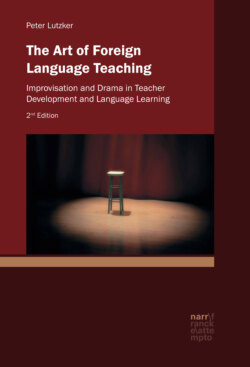Читать книгу The Art of Foreign Language Teaching - Peter Lutzker - Страница 38
На сайте Литреса книга снята с продажи.
2.6 Conclusions
ОглавлениеIn taking into account the types of demands made on language teachers today, it is unsurprising that traditional models of in-service courses, generally focusing on new methodological procedures, have increasingly been viewed as both outdated and inadequate. The realities of the lives of many language teachers indicate they have different needs. They point to the necessity of introducing new forms of courses which potentially offer something far more meaningful and transformative than what has commonly been found in most in-service teacher training. In the context of this study of an in-service development course for language teachers, the issue of personal development and growth as well as the factors of stress and burnout are considered to be essential in considering the potential value of such courses.
In the sense in which Edelhoff refers to the development of personal qualities such as enthusiasm, openness and empathy, or in Legutke’s emphasis on the necessity of taking risks in order to affect change, visions of teacher development which clearly transcend traditional conceptions have also been offered. Achieving such dimensions of personal change requires that a number of factors be taken into account in regard to both the content and structure of such courses.
The following chapters will address these issues directly. Many of the clowning courses which will be the focus of this empirical research study took place during the annual intensive five-day in-service course for English teachers in Waldorf Schools – the English Week. Some also took place in the context of the English Fortnight, a two-week summer course offered in the years 1999 and 2000 in Emerson College, England, at the Baltic Seminar in July, 2003 in Helsinki, Finnland, and at the Institut für Waldorfpädagogik in Witten-Annen, Germany, in January, 2005. All of these programs were designed as in-service programs for foreign language teachers (mostly, but not exclusively English teachers) at Steiner schools throughout Europe.
Before specifically discussing and evaluating those courses, it will be necessary to gain a clearer understanding of the larger frameworks in which they took place. In almost all of these cases, the clowning workshops were not artistic courses for language teachers standing on their own, but were inextricably tied to the concept of an entire program, including daily lectures, methodology sessions, seminars and other artistic courses.184 Hence, each of these programs was created with the intention of realizing a vision of language teaching within a coherent framework: within that conceptual structure, the artistic work, including the clowning courses, played a decisive role. It will thus be necessary to first consider that wider vision before focusing on a specific course. In this context, the particular focus will be on the English Week, not only because of the larger number of participants (and responses), but also because it is the only on-going program: the English Fortnight whose course leaders were almost identical with the English Week was, in effect, integrated into the English Week, and the Baltic Seminar was a three year in-service program lasting from 2002–2005.185
